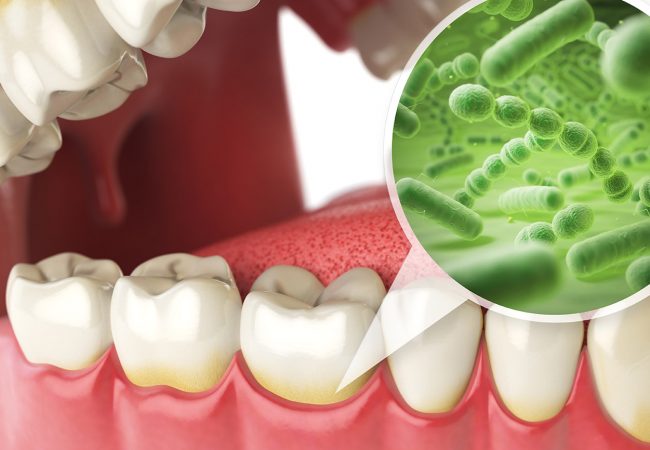Periodontal Disease
Periodontal Disease or Gum Disease as it is commonly known, is the leading cause of tooth loss in adults, accounting for 70% of all lost teeth. Periodontal disease is a chronic inflammatory disease of the gums and teeth-supporting bone. It is caused by the body’s reaction to the irritation of toxic bacteria (plaque) and calcium deposits (tartar/calculus) that collect at and below the gum line.
Left untreated, periodontal disease progresses from tender, bleeding gums, known as gingivitis, to the loss of the supporting bone that holds the teeth in place, a condition we call periodontitis. Untreated periodontitis will eventually result in tooth loss. In its early stages, gum disease can advance with few signs or symptoms. Most patients diagnosed with this condition have no pain and are surprised by the amount of damage that periodontal disease has already caused.
While periodontal disease is not curable, and the loss of bone is not reversible, it is certainly treatable, controllable and preventable.

Periodontal Examination & Diagnosis

There are several things that we need to evaluate before we make a gum disease diagnosis. The teeth are examined for looseness (mobility) and necessary x-rays are taken to examine the level, shape, and density of the bone around your teeth.
The gums are examined for contour, texture, color, and fragility. The small collar of gum around each tooth is evaluated and carefully measured for depth, using a periodontal probe, calibrated in millimeters. Healthy gum collars are usually 2-3 millimeters deep, a space easily cleaned by floss and toothbrushes.
Measurements over 3 millimeters (pockets) that bleed upon gentle probing indicate the presence of periodontal disease. Deeper readings indicate bone loss and more advanced disease than shallower readings.
Periodontal Cleaning and Treatment
After establishing a diagnosis defining the severity of gum disease, a personalized treatment plan is created. In early stages of the disease, with little or no bone loss, one or two visits with our hygiene team will usually bring the condition under control. When you leave our office with a strategy for daily home care and an established schedule for maintenance, little additional treatment may be needed.
If periodontal disease has advanced and measurable bone loss is evident, a more in-depth periodontal cleaning process called Scaling & Root Planing (SRP) is indicated. Sometimes referred to as deep cleaning, SRP is a site-specific treatment that targets the deep and inflamed pockets where bone loss is occurring. Our hygienists numb and completely clean and polish the root surfaces of the affected areas, removing all plaque and tartar. When appropriate, site-specific antibiotics (Atridox) can be placed into the cleaned pockets to treat the infected gums and speed healing.
We have found that a non-surgical approach to periodontal therapy is very effective for most patients suffering from mild and moderate stages of the disease.
Patients with significant gums and bone loss may not need periodontal surgery and may benefit from this approach, showing a reduction in both the number and depth of periodontal pockets.
Regular teeth cleaning can make the difference as a specialist can remove issues from the teeth and gums. If we find areas that are too severe to respond to SRP treatment, we will enlist the aid of a periodontal specialist (periodontist), trained in the treatment and control of severe periodontitis.

Periodontal Maintenance
Regular dental cleanings and exams from a professional, in addition to excellent oral hygiene home care, remain essential to detecting and proactively managing periodontal disease.
Most patients with mild periodontal disease can be successfully maintained in good dental health on a twice-a-year maintenance schedule. Patients whose genetic and dietary factors allow for rapid tartar and stain buildup may require three visits a year. Patients who have been treated with SRP and have deeper pockets will require a 3-month schedule to maintain previously affected areas, as well as to diagnose and treat newly affected areas in the earliest stages.


Periodontal Disease & Overall Health with regular Dental Cleanings
Did you know that your oral health offers clues about your overall health – or that problems in your mouth can affect the rest of your body? Like other areas of the body, your mouth is home to millions of mostly harmless bacteria. But your mouth is the entry point to your digestive and respiratory tracts, and some of these bacteria can cause bad breath, and worse, disease.
Studies suggest that oral bacteria and the inflammation associated with periodontitis might play a role in some diseases. And certain diseases, such as diabetes and HIV/AIDS, can lower the body’s resistance to infection, making oral health problems more severe.
Your oral health might contribute to various diseases and conditions, including endocarditis and cardiovascular disease. Although the connection is not fully understood, research suggests that heart disease, clogged arteries and stroke might be linked to the inflammation and infections that oral bacteria can cause. Certain bacteria in your mouth can be pulled into your lungs, causing pneumonia and other respiratory diseases.
Periodontitis has been linked in pregnancy to premature birth and low birth weight. Gum disease appears to be more frequent and severe among people who have diabetes. Research shows that people who have gum disease have a harder time controlling their blood sugar levels. Regular periodontal care can improve diabetes control.
The bone-weakening disease, osteoporosis, is linked with periodontal bone loss and its resultant tooth loss. Worsening oral health is seen as Alzheimer’s disease progresses.
Other conditions that might be linked to oral health include eating disorders, rheumatoid arthritis, certain cancers, and an immune system disorder that causes dry mouth (Sjogren’s syndrome).
Tell us about the medications you take and about changes in your overall health, especially if you have recently been ill or you have a chronic condition, such as diabetes.
